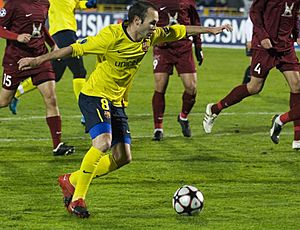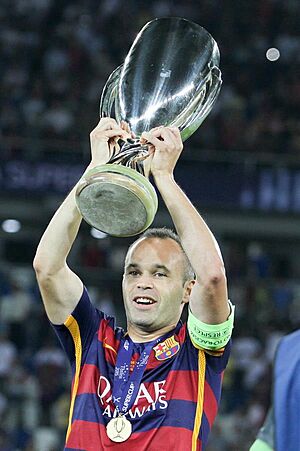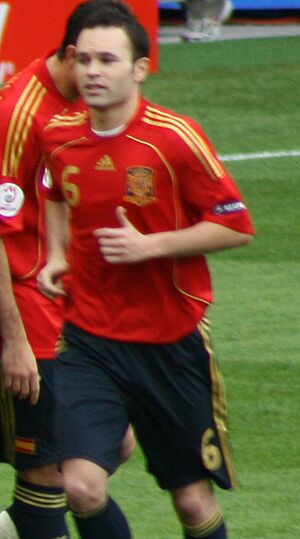Andrés Iniesta facts for kids
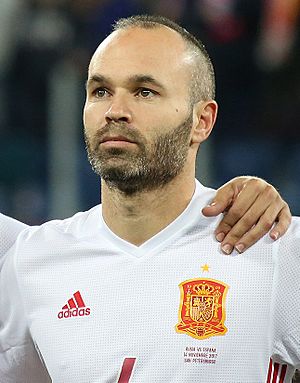
Iniesta with Spain in 2017
|
|||||||||||||||||||||||||||||||||||||||||||||||||
| Personal information | |||||||||||||||||||||||||||||||||||||||||||||||||
|---|---|---|---|---|---|---|---|---|---|---|---|---|---|---|---|---|---|---|---|---|---|---|---|---|---|---|---|---|---|---|---|---|---|---|---|---|---|---|---|---|---|---|---|---|---|---|---|---|---|
| Full name | Andrés Iniesta Luján | ||||||||||||||||||||||||||||||||||||||||||||||||
| Date of birth | 11 May 1984 | ||||||||||||||||||||||||||||||||||||||||||||||||
| Place of birth | Fuentealbilla, Spain | ||||||||||||||||||||||||||||||||||||||||||||||||
| Height | 1.71 m (5 ft 7 in) | ||||||||||||||||||||||||||||||||||||||||||||||||
| Position(s) | Midfielder | ||||||||||||||||||||||||||||||||||||||||||||||||
| Youth career | |||||||||||||||||||||||||||||||||||||||||||||||||
| 1994–1996 | Albacete | ||||||||||||||||||||||||||||||||||||||||||||||||
| 1996–2001 | Barcelona | ||||||||||||||||||||||||||||||||||||||||||||||||
| Senior career* | |||||||||||||||||||||||||||||||||||||||||||||||||
| Years | Team | Apps | (Gls) | ||||||||||||||||||||||||||||||||||||||||||||||
| 2000–2003 | Barcelona B | 49 | (5) | ||||||||||||||||||||||||||||||||||||||||||||||
| 2002–2018 | Barcelona | 442 | (35) | ||||||||||||||||||||||||||||||||||||||||||||||
| 2018–2023 | Vissel Kobe | 114 | (21) | ||||||||||||||||||||||||||||||||||||||||||||||
| 2023–2024 | Emirates | 20 | (5) | ||||||||||||||||||||||||||||||||||||||||||||||
| Total | 625 | (66) | |||||||||||||||||||||||||||||||||||||||||||||||
| International career | |||||||||||||||||||||||||||||||||||||||||||||||||
| 2000 | Spain U15 | 2 | (0) | ||||||||||||||||||||||||||||||||||||||||||||||
| 2000–2001 | Spain U16 | 7 | (1) | ||||||||||||||||||||||||||||||||||||||||||||||
| 2001 | Spain U17 | 4 | (0) | ||||||||||||||||||||||||||||||||||||||||||||||
| 2001–2002 | Spain U19 | 7 | (1) | ||||||||||||||||||||||||||||||||||||||||||||||
| 2003 | Spain U20 | 7 | (3) | ||||||||||||||||||||||||||||||||||||||||||||||
| 2003–2006 | Spain U21 | 18 | (6) | ||||||||||||||||||||||||||||||||||||||||||||||
| 2004 | Catalonia | 1 | (0) | ||||||||||||||||||||||||||||||||||||||||||||||
| 2006–2018 | Spain | 131 | (13) | ||||||||||||||||||||||||||||||||||||||||||||||
|
Medal record
|
|||||||||||||||||||||||||||||||||||||||||||||||||
| *Club domestic league appearances and goals | |||||||||||||||||||||||||||||||||||||||||||||||||
Andrés Iniesta Luján (born 11 May 1984) is a Spanish former professional footballer. He played as a midfielder for most of his career. Iniesta is known as one of the greatest midfielders ever. People admired his amazing balance, ball control, and quickness in tight spaces. He also had great skill and flair with the ball.
Iniesta started his football journey at La Masia, which is Barcelona's youth academy. He moved there from his hometown at a young age and quickly impressed everyone. He played his first game with the main team when he was 18, in 2002. By the 2004–05 season, he was playing regularly. He stayed with Barcelona until 2018. Iniesta won 35 trophies, including nine La Liga titles and four UEFA Champions League titles. This makes him the most successful Spanish footballer of all time.
Under coach Pep Guardiola, Iniesta was part of a famous midfield trio. He played alongside Xavi and Sergio Busquets. This trio helped Barcelona achieve incredible success from 2008 to 2015. They won five La Liga titles, three Copa del Rey titles, and three UEFA Champions League titles. They even won the treble (all three major titles in one season) twice! This happened in 2008–09 and 2014–15. After 22 years at Barcelona, Iniesta joined J1 League club Vissel Kobe in 2018. He left Vissel Kobe in 2023 and then played for Emirates in the UAE Pro League. He officially retired from professional football in October 2024.
Iniesta also played for Spain's national teams at different age levels. He played for the Under-16, Under-19, and Under-21 teams. He made his debut for the senior national team in 2006. He helped Spain win UEFA Euro 2008, playing in every game. He was even chosen for the Team of the Tournament. Iniesta was a key player when Spain won the 2010 FIFA World Cup. He scored the winning goal in the final against the Netherlands. For this, he was named the Man of the Match. His great performances in 2010 for both his club and country led him to be the runner-up for the 2010 FIFA Ballon d'Or award, behind Lionel Messi. At UEFA Euro 2012, Iniesta led Spain to win their second European title in a row. He was again named Man of the Match in the final against Italy. He was also named the Player of the Tournament.
Iniesta was chosen for the FIFA FIFPro World XI nine times. He was also selected for the UEFA Team of the Year six times. He was named in the All-time UEFA Euro XI. In 2012, he won the UEFA Best Player in Europe Award. He was also named the IFFHS World's Best Playmaker in 2012 and 2013. Besides being runner-up for the Ballon d'Or in 2010, he also came in third place in 2012.
Contents
Iniesta's Club Career
Starting at Barcelona
Early Days and Training
Iniesta grew up in Fuentealbilla, a small village in Spain. He mostly played futsal there because there weren't many football fields. When he was 12, he played for Albacete Balompié in a junior tournament. Scouts from big clubs noticed his talent. His parents knew Enrique Orizaola, a youth coach for Barcelona. Orizaola convinced them to let Iniesta join Barcelona's youth academy. Iniesta visited La Masia, which is where the club's young players live and train. The visit helped his parents decide to enroll him there.
Iniesta said he "cried rivers" when he left home for La Masia. He found it hard to be away from his parents. He was very shy and kept to himself at first. He became captain of the Barcelona Under-15 team. They won the Nike Premier Cup in 1999, with Iniesta scoring the winning goal in the last minute. He was named the best player of the tournament. When Iniesta first arrived, the team's captain, Pep Guardiola, famously told Xavi: "You're going to retire me. This lad [Iniesta] is going to retire us all."
Becoming a Regular Player (2004–2008)
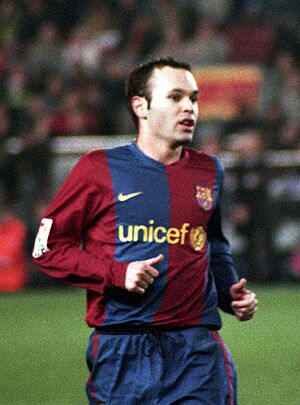
Iniesta joined Barcelona's first team when Radomir Antić was the coach. On 29 October 2002, he played his first game for the senior team. It was a UEFA Champions League match against Club Brugge, which Barcelona won 1–0. In the 2004–05 season, he played in 37 out of 38 league games. This was more than any other player. He scored two goals as Barcelona won the La Liga title.
When Xavi got injured at the start of the 2005–06 season, Iniesta started more often in midfield. He continued to improve his skills. He played in 11 Champions League games, including the 2006 final. He came on at half-time in that final. His coach, Frank Rijkaard, praised his contribution. Barcelona won both the league and the Champions League that season.
In the 2006–07 season, Iniesta became even more well-known. People admired him for being willing to play in any position for his team. Before the season, he lifted the Joan Gamper Trophy as team captain after a 4–0 win against Bayern Munich. He even played as a left-wing forward in some Champions League matches, scoring twice. Even though his coach moved him around the field, the 2006–07 season was Iniesta's highest-scoring season.
For the 2007–08 season, Iniesta changed his shirt number from 24 to his favorite number 8. He signed a new contract until 2014 in January 2008. His release clause (the amount a club would have to pay to buy him) was raised to €150 million. Football experts often named Iniesta as one of the best players in La Liga during these years. He also finished ninth in the 2008 FIFA World Player of the Year voting.
Barcelona's Treble Success (2008–2012)
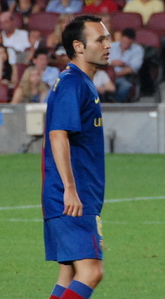
At the start of the 2008–09 season, Iniesta was chosen as the fourth captain of Barcelona. The other captains were Carles Puyol, Xavi, and Víctor Valdés. All four players came from Barcelona's youth system. Iniesta's performances that season were highly praised. He often received standing ovations from fans, even from rival teams.
He had a leg injury in November 2008 but returned in January. In his first game back, he scored a crucial goal against Mallorca. A few days later, he captained Barcelona for the first time in an official match. This was a 3–1 win against Atlético Madrid in the Copa del Rey.
Iniesta got another injury but returned for the Champions League quarter-final against Bayern Munich. Barcelona won that game 4–0. He scored a very important goal in the last minute of the Champions League semi-final against Chelsea. His amazing shot from 25 yards out made the score 1–1. This goal meant Barcelona went through to the final because of the "away goals" rule. Iniesta later wrote that he hit the ball "right from my heart, with all my might."
Iniesta's goal against Chelsea sent Barcelona to the final in Rome. They played against Manchester United. Before the final, United's manager Alex Ferguson said Iniesta was Barcelona's biggest threat. He called Iniesta "fantastic" and praised his passing, movement, and ability to create space. Even with a thigh injury, Iniesta played in the final. He helped set up the first goal scored by Samuel Eto'o. Barcelona won the game 2–0. After the match, Manchester United striker Wayne Rooney called Iniesta the best player in the world.
Iniesta received many awards for his performances that season. He was rated as the most consistent player in the league. He also finished fifth for the 2009 FIFA World Player of the Year award and fourth for the Ballon d'Or. Barcelona extended his contract until 2015 and increased his release clause to €200 million.
Barcelona won their second league title in a row in the 2009–10 season. They set a record with 99 points. However, Iniesta had a season with many injuries. He missed pre-season training because of a thigh injury from the 2009 Champions League final. He played in many matches but often came on as a substitute. His season ended early in April due to a calf injury.
Iniesta also went through a difficult time emotionally during this period. His close friend, Daniel Jarque, who was also a footballer, passed away in August 2009. This deeply affected Iniesta. Even when he was physically fit, he sometimes struggled to complete training. He sought help and found comfort. When he scored Spain's winning goal in the 2010 FIFA World Cup final, he dedicated it to Jarque. He showed a message on his undershirt that said, "Dani Jarque, always with us." Iniesta said he did it because he "felt it deeply" and it showed that being human and a good person is most important.
Iniesta scored his first goal of the 2010–11 season in the first league game. He chipped the ball into the net from 30 yards away. Throughout this season, he received standing ovations from fans of opposing teams. They showed their appreciation for his World Cup-winning goal. He also received a standing ovation at the home stadium of Espanyol. The crowd recognized his friendship with Daniel Jarque, who was Espanyol's captain. Iniesta was one of the three finalists for the 2010 FIFA Ballon d'Or, along with Xavi and Messi. He finished as runner-up behind Messi.
Iniesta started the 2011–12 season by scoring the first goal in the Supercopa de España against rivals Real Madrid. Barcelona won the match 3–2 and the cup 5–4 overall. He scored another great goal in October against Viktoria Plzeň in the Champions League. He played a record 51 matches in La Liga without a defeat. In the Champions League, he scored a vital goal against Milan in the quarter-finals. He then scored in the semi-final against Chelsea, but Barcelona was eliminated. In November, Iniesta was named man of the match after scoring one goal and assisting three others in a 4–0 win. His performances earned him third place in the voting for the 2012 FIFA Ballon d'Or.
Captain and Farewell (2013–2018)
Iniesta signed a new contract with Barcelona in December 2013, keeping him at the club until 2018. As vice-captain, he often led the team during their second treble-winning season in 2014–15. He became the main captain after Carles Puyol retired and Xavi left. Iniesta scored three goals during the team's Copa del Rey campaign. He was named man of the match in the 2015 UEFA Champions League Final. He assisted Ivan Rakitić's first goal in their 3–1 win over Juventus. Barcelona became the first club to win the treble (domestic league, domestic cup, and European Cup) twice. Iniesta was one of seven players who were part of both treble-winning teams.
During the first Clásico of the 2015–16 season, Iniesta received applause from Real Madrid fans at the Santiago Bernabéu. Only two other Barcelona players, Diego Maradona and Ronaldinho, had received such an honor. His man-of-the-match performance included a goal and an assist in a big 4–0 victory.
He signed a lifetime contract with Barcelona on 6 October 2017. This meant he would stay with the club for the rest of his career. On 7 January 2018, he played his 650th game for Barcelona. The game ended in a 3–0 win for Barcelona.
Despite the lifetime contract, Iniesta announced on 27 April 2018 that he would leave Barcelona at the end of the season. He played his 674th and final game for Barcelona on 20 May. It was a 1–0 home win over Real Sociedad. Barcelona celebrated winning their 25th league title and 30th Copa del Rey title. Iniesta left the field in the 81st minute to a huge ovation.
Playing in Japan and UAE
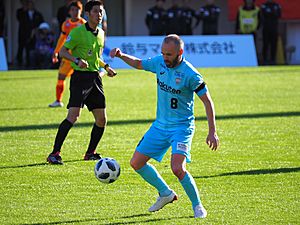
On 24 May 2018, Japanese club Vissel Kobe announced they had signed Iniesta for three years. He played his first game on 22 July as a substitute. On 11 August 2018, Iniesta scored his first goal in the J1 League. On 21 December 2019, he scored in the semi-final of the 2019 Emperor's Cup. On 1 January 2020, he won his first trophy in Japan, as Vissel Kobe won the 2019 Emperor's Cup. A month later, he also won the 2020 Japanese Super Cup.
On 7 December 2020, Iniesta got a muscle injury during a Champions League game. He had successful surgery in Barcelona a few days later. On 11 May 2021, Iniesta extended his contract with Vissel Kobe for two more seasons. He was named J.League Monthly MVP in November 2021. He was also chosen for the 2021 J.League Best XI. On 14 May 2022, Iniesta scored a goal and helped Vissel Kobe get their first league win of the 2022 season. On 25 May 2023, Vissel Kobe announced Iniesta would leave the club on 1 July. He had played less in his final season but wanted to continue playing regularly.
On 7 August 2023, Iniesta joined the UAE Pro League club Emirates. He signed a one-year contract. He made his debut on 19 August 2023. On 25 August 2023, he scored his first goal for Emirates from a penalty kick. His first season with Emirates ended with the team finishing 13th and being moved down to a lower league.
On 7 October 2024, Iniesta announced that he was retiring from professional football.
Iniesta's International Career
Early International Success (2001–2008)
Iniesta first became known on the international stage in 2001. He helped Spain win the 2001 UEFA European Under-16 Championship. He also played for his country at the 2001 FIFA U-17 World Championship. The next year, he was part of the team that won the 2002 UEFA European Under-19 Championship. After that, he was a regular choice for youth coach Juan Santisteban. In 2003, he helped Spain reach the final of the 2003 FIFA World Youth Championship. He was named to the FIFA all-star team. Iniesta was also captain of the Spain U21 side many times.
Iniesta was surprisingly called up to the senior Spain squad for the 2006 FIFA World Cup on 15 May 2006. He played his first game in a friendly match against Russia on 27 May. His first goal for Spain came in another friendly match against England on 7 February 2007. His long-range shot hit the underside of the crossbar and gave Spain the lead. Iniesta played a key role in Spain qualifying for UEFA Euro 2008. He scored goals and assisted strikers.
European and World Champion (2008–2012)
Iniesta was part of Spain's squad for UEFA Euro 2008. He played an important role in midfield, even though a stomach issue affected him. He played in Spain's first two group matches. He provided a pass for David Villa's second goal against Russia. Iniesta played the entire 90 minutes in the semi-final against Russia. He made a cross that Xavi scored from, and Spain won 3–0. Iniesta was named Man of the Match for that game. He also played the whole final as Spain beat Germany 1–0. Iniesta was named in the Team of the Tournament. He missed the 2009 FIFA Confederations Cup due to a thigh injury.
Iniesta was chosen for Spain in the 2010 World Cup. He scored the second goal in a 2–1 group stage win against Chile. He was also named man of the match for that game. For his excellent performances, Iniesta was a candidate for the Golden Ball award. In the final, he scored the winning goal in the 116th minute against the Netherlands. He received a yellow card for taking off his jersey during his celebration. He revealed a message for his late friend Dani Jarque. He won the man of the match award for his performance in the final. This victory gave Spain its first-ever World Cup title.
At UEFA Euro 2012, Iniesta was named man of the match in three different games. He was also chosen as man of the match in the final against Italy, which Spain won 4–0. By winning this award, Iniesta became the only Spanish player to win it at least once in each of Spain's three successful tournaments in a row. Iniesta was also named the UEFA Euro 2012 Player of the Tournament.
Later International Years (2013–2018)
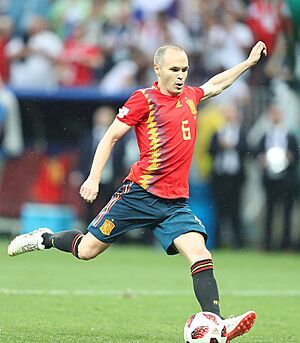
At the 2013 FIFA Confederations Cup, Iniesta was named in the Team of the Tournament. He also received the Silver Ball award as the second-best player. Spain finished second to host nation Brazil. Iniesta started all three matches for Spain at the 2014 World Cup. He earned his 100th cap in the team's last group match. At UEFA Euro 2016, he assisted the only goal against Czech Republic. He was man of the match, helping Spain start the tournament with a win. He played in all four of Spain's matches. They were later knocked out by Italy.
In May 2018, Iniesta was named in Spain's squad for the 2018 FIFA World Cup in Russia. He started in all three group stage matches. He assisted Isco's goal in a 2–2 draw against Morocco. He came on as a substitute in Spain's last match against Russia on 1 July 2018. After Spain lost in a penalty shootout, Iniesta announced his retirement from international duty. He played 131 games for Spain. At the time of his retirement, he was the nation's fourth-most-capped player ever.
Media and Personal Life
Iniesta had a sponsorship deal with the sportswear company Nike. He appeared in Nike commercials with other famous footballers. Iniesta is also featured in EA Sports' FIFA video game series. His special move, La Croqueta, is even in FIFA 19. In March 2015, Iniesta had one of the highest social media rankings among sportspeople. In October 2018, Iniesta signed a new sponsorship deal with Japanese sportswear company Asics.
Iniesta is married to Anna Ortiz. They started dating in 2008 and got married on 8 July 2012. They have three daughters and two sons: Valeria (born 2011), Paolo Andrea (born 2015), Siena (born 2017), Romeo (born 2019), and Olimpia (born 2023). The couple experienced the loss of an unborn child in March 2014. Iniesta is a Catholic.
In 2011, Iniesta invested €420,000 in his childhood club, Albacete. This made him a major shareholder. Two years later, when the club faced financial difficulties, he loaned them another €240,000 to help pay unpaid wages.
In May 2018, Iniesta shared that he went through a very tough emotional period before the 2010 FIFA World Cup. This was due to his injuries and the passing of his friend Daniel Jarque.
In September 2018, Iniesta and his Vissel Kobe teammate Lukas Podolski helped raise money for the victims of the 2018 Hokkaido Eastern Iburi earthquake in Japan.
Career Statistics
Club Appearances
| Club | Season | League | National cup | League cup | Continental | Other | Total | |||||||
|---|---|---|---|---|---|---|---|---|---|---|---|---|---|---|
| Division | Apps | Goals | Apps | Goals | Apps | Goals | Apps | Goals | Apps | Goals | Apps | Goals | ||
| Barcelona B | 2000–01 | Segunda División B | 10 | 0 | — | — | — | — | 10 | 0 | ||||
| 2001–02 | Segunda División B | 25 | 2 | — | — | — | 5 | 0 | 30 | 2 | ||||
| 2002–03 | Segunda División B | 14 | 3 | — | — | — | — | 14 | 3 | |||||
| Total | 49 | 5 | — | — | — | 5 | 0 | 54 | 5 | |||||
| Barcelona | 2002–03 | La Liga | 6 | 0 | 0 | 0 | — | 3 | 0 | — | 9 | 0 | ||
| 2003–04 | La Liga | 11 | 1 | 3 | 1 | — | 3 | 0 | – | 17 | 2 | |||
| 2004–05 | La Liga | 37 | 2 | 1 | 0 | — | 8 | 0 | — | 46 | 2 | |||
| 2005–06 | La Liga | 33 | 0 | 4 | 0 | — | 11 | 1 | 1 | 0 | 49 | 1 | ||
| 2006–07 | La Liga | 37 | 6 | 6 | 1 | — | 8 | 2 | 5 | 0 | 56 | 9 | ||
| 2007–08 | La Liga | 31 | 3 | 7 | 0 | — | 11 | 1 | — | 49 | 4 | |||
| 2008–09 | La Liga | 26 | 4 | 6 | 0 | — | 11 | 1 | — | 43 | 5 | |||
| 2009–10 | La Liga | 29 | 1 | 3 | 0 | — | 9 | 0 | 1 | 0 | 42 | 1 | ||
| 2010–11 | La Liga | 34 | 8 | 5 | 0 | — | 10 | 1 | 1 | 0 | 50 | 9 | ||
| 2011–12 | La Liga | 27 | 2 | 6 | 2 | — | 8 | 3 | 5 | 1 | 46 | 8 | ||
| 2012–13 | La Liga | 31 | 3 | 5 | 2 | — | 10 | 1 | 2 | 0 | 48 | 6 | ||
| 2013–14 | La Liga | 35 | 3 | 6 | 0 | — | 9 | 0 | 2 | 0 | 52 | 3 | ||
| 2014–15 | La Liga | 24 | 0 | 7 | 3 | — | 11 | 0 | — | 42 | 3 | |||
| 2015–16 | La Liga | 28 | 1 | 4 | 0 | — | 7 | 0 | 5 | 0 | 44 | 1 | ||
| 2016–17 | La Liga | 23 | 0 | 5 | 0 | — | 8 | 1 | 1 | 0 | 37 | 1 | ||
| 2017–18 | La Liga | 30 | 1 | 5 | 1 | — | 8 | 0 | 1 | 0 | 44 | 2 | ||
| Total | 442 | 35 | 73 | 10 | — | 135 | 11 | 24 | 1 | 674 | 57 | |||
| Vissel Kobe | 2018 | J1 League | 14 | 3 | 1 | 0 | 0 | 0 | — | — | 15 | 3 | ||
| 2019 | J1 League | 23 | 6 | 2 | 1 | 0 | 0 | — | — | 25 | 7 | |||
| 2020 | J1 League | 26 | 4 | 0 | 0 | 1 | 0 | 6 | 2 | 1 | 0 | 34 | 6 | |
| 2021 | J1 League | 23 | 6 | 0 | 0 | 4 | 1 | — | — | 27 | 7 | |||
| 2022 | J1 League | 24 | 2 | 1 | 0 | 1 | 0 | 1 | 1 | — | 27 | 3 | ||
| 2023 | J1 League | 4 | 0 | 0 | 0 | 2 | 0 | — | — | 6 | 0 | |||
| Total | 114 | 21 | 4 | 1 | 8 | 1 | 7 | 3 | 1 | 0 | 134 | 26 | ||
| Emirates | 2023–24 | UAE Pro League | 20 | 5 | 1 | 0 | 2 | 0 | — | — | 23 | 5 | ||
| Career total | 625 | 66 | 78 | 11 | 10 | 1 | 142 | 14 | 30 | 1 | 885 | 93 | ||
International Appearances
| National team | Year | Competitive | Friendly | Total | |||
|---|---|---|---|---|---|---|---|
| Apps | Goals | Apps | Goals | Apps | Goals | ||
| Spain | 2006 | 3 | 0 | 5 | 0 | 8 | 0 |
| 2007 | 9 | 3 | 3 | 1 | 12 | 4 | |
| 2008 | 10 | 1 | 4 | 0 | 14 | 1 | |
| 2009 | 2 | 0 | 3 | 0 | 5 | 0 | |
| 2010 | 9 | 3 | 6 | 0 | 15 | 3 | |
| 2011 | 2 | 0 | 7 | 1 | 9 | 1 | |
| 2012 | 9 | 0 | 5 | 1 | 14 | 1 | |
| 2013 | 10 | 0 | 7 | 0 | 17 | 0 | |
| 2014 | 5 | 0 | 3 | 1 | 8 | 1 | |
| 2015 | 3 | 1 | 2 | 0 | 5 | 1 | |
| 2016 | 6 | 0 | 2 | 0 | 8 | 0 | |
| 2017 | 4 | 0 | 4 | 1 | 8 | 1 | |
| 2018 | 4 | 0 | 4 | 0 | 8 | 0 | |
| Total | 76 | 8 | 55 | 5 | 131 | 13 | |
- Scores and results list Spain's goal tally first, score column indicates score after each Iniesta goal.
| No. | Date | Venue | Opponent | Score | Result | Competition |
|---|---|---|---|---|---|---|
| 1 | 7 February 2007 | Old Trafford, Manchester, England | 1–0 | 1–0 | Friendly | |
| 2 | 28 March 2007 | Iberostar Stadium, Palma, Spain | 1–0 | 1–0 | UEFA Euro 2008 qualifying | |
| 3 | 8 September 2007 | Laugardalsvöllur, Reykjavík, Iceland | 1–1 | 1–1 | UEFA Euro 2008 qualifying | |
| 4 | 17 November 2007 | Santiago Bernabéu Stadium, Madrid, Spain | 2–0 | 3–0 | UEFA Euro 2008 qualifying | |
| 5 | 25 October 2008 | King Baudouin Stadium, Brussels, Belgium | 1–1 | 2–1 | 2010 FIFA World Cup qualification | |
| 6 | 25 June 2010 | Loftus Versfeld, Pretoria, South Africa | 2–0 | 2–1 | 2010 FIFA World Cup | |
| 7 | 11 July 2010 | FNB Stadium, Johannesburg, South Africa | 1–0 | 1–0 | 2010 FIFA World Cup Final | |
| 8 | 12 October 2010 | Hampden Park, Glasgow, Scotland | 2–0 | 3–2 | UEFA Euro 2012 qualifying | |
| 9 | 2 September 2011 | kybunpark, St. Gallen, Switzerland | 1–2 | 3–2 | Friendly | |
| 10 | 29 February 2012 | La Rosaleda Stadium, Málaga, Spain | 1–0 | 5–0 | Friendly | |
| 11 | 30 May 2014 | Ramón Sánchez Pizjuán Stadium, Seville, Spain | 2–0 | 2–0 | Friendly | |
| 12 | 5 September 2015 | Carlos Tartiere Stadium, Oviedo, Spain | 2–0 | 2–0 | UEFA Euro 2016 qualifying | |
| 13 | 11 November 2017 | La Rosaleda Stadium, Málaga, Spain | 5–0 | 5–0 | Friendly |
Honours and Awards
Club Trophies
Barcelona
- La Liga: 2004–05, 2005–06, 2008–09, 2009–10, 2010–11, 2012–13, 2014–15, 2015–16, 2017–18
- Copa del Rey: 2008–09, 2011–12, 2014–15, 2015–16, 2016–17, 2017–18
- Supercopa de España: 2005, 2006, 2010, 2011, 2013, 2016
- UEFA Champions League: 2005–06, 2008–09, 2010–11, 2014–15
- UEFA Super Cup: 2011, 2015
- FIFA Club World Cup: 2009, 2011, 2015
Vissel Kobe
- Emperor's Cup: 2019
- Japanese Super Cup: 2020
- J1 League: 2023
International Trophies
Spain U16
- UEFA European Under-16 Championship: 2001
Spain U19
- UEFA European Under-19 Championship: 2002
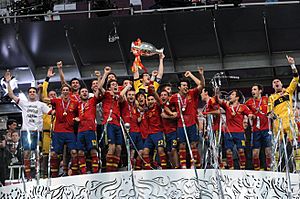
Spain
- FIFA World Cup: 2010
- UEFA European Championship: 2008, 2012
Individual Awards
- UEFA Euro Team of the Tournament: 2008, 2012
- La Liga Best Spanish Player: 2009
- La Liga Best Midfielder: 2009, 2011, 2012, 2013, 2014
- FIFA FIFPro World11: 2009, 2010, 2011, 2012, 2013, 2014, 2015, 2016, 2017
- UEFA Team of the Year: 2009, 2010, 2011, 2012, 2015, 2016
- Onze de Bronze: 2009
- FIFA World Cup Dream Team: 2010
- ESM Team of the Year: 2010–11, 2017–18
- Onze d'Argent: 2011
- Marca Legend Award: 2011
- UEFA Best Player in Europe Award: 2012
- UEFA Euro Player of the Tournament: 2012
- IFFHS World's Best Playmaker: 2012, 2013
- IFFHS World Team of the Decade 2011–2020
- IFFHS UEFA Team of the decade 2011–2020
- FIFA Confederations Cup Silver Ball: 2013
- La Liga top assist provider: 2012–13
- Golden Foot: 2014
- UEFA Champions League Squad of the Season: 2014–15, 2015–16
- UEFA Ultimate Team of the Year (published 2015)
- FIFA Club World Cup Bronze Ball: 2015
- France Football World XI: 2015
- La Liga Team of the Season: 2015–16
- UEFA Euro All-time XI (published 2016)
- J.League Best XI: 2019, 2021
- Ballon d'Or Dream Team (Bronze): 2020
Decorations
- Prince of Asturias Awards: 2010
- Gold Medal of the Royal Order of Sporting Merit: 2011
- Queen Sofia Award: 2017
- Grand Cross of the Royal Order of Sports Merit: 2018
See also
 In Spanish: Andrés Iniesta para niños
In Spanish: Andrés Iniesta para niños
 | Emma Amos |
 | Edward Mitchell Bannister |
 | Larry D. Alexander |
 | Ernie Barnes |


